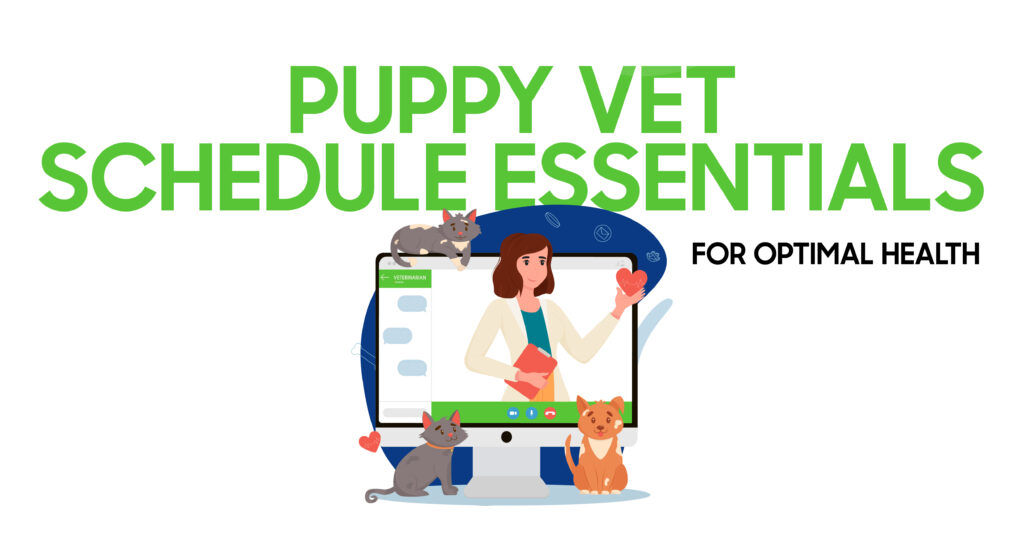Puppies grow fast, and so do their healthcare needs. Establishing a puppy vet schedule from the very start is key to ensuring they develop into healthy, happy adult dogs. From their first vet visit to core vaccinations, deworming, and wellness checkups, a consistent schedule helps prevent disease, detect health concerns early, and build a strong foundation for lifelong well-being.
In this guide, we’ll walk you through the puppy vaccination timeline, vet appointment intervals, and the wellness plan essentials every new dog owner should know.
The Importance of Early Puppy Health Checkups
Puppies are especially vulnerable to illnesses in their first months. Early vet visits allow your veterinarian to:
- Perform a complete physical examination to check for congenital issues.
- Discuss nutrition, behavior, and training tips tailored to your puppy’s needs.
- Begin the core vaccination series to protect against dangerous diseases like parvovirus, distemper, and rabies.
Essential Vaccinations for Puppies
Puppies require a series of vaccinations to build strong immunity during their first year. Core vaccines typically include:
- DHPP (Distemper, Hepatitis, Parvovirus, Parainfluenza)
- Rabies (required by law in many regions)
- Bordetella (for kennel cough, often required by boarding facilities)
Understanding Your Puppy Vaccination Schedule
Vaccinations are one of the most important steps in protecting your puppy from serious and potentially life-threatening diseases. Following a structured schedule ensures your dog develops strong immunity during their early months and maintains it throughout life.
Here’s a general vaccination timeline:
| Puppy Age | Core Vaccines | Additional Notes |
| 6–8 weeks | First DHPP shot (Distemper, Hepatitis, Parvovirus, Parainfluenza) | Begin safe socialization – introduce your puppy to gentle handling, new sounds, and calm environments at home. Avoid public dog parks until fully vaccinated. |
| 10–12 weeks | Second DHPP shot, optional Bordetella (for kennel cough) | Start leash training and short, positive outdoor walks in low-risk areas. Bordetella is recommended if your puppy will be in contact with other dogs. |
| 14–16 weeks | Final DHPP shot, Rabies vaccine | At this point, your puppy achieves core immunity. Continue socialization with more varied experiences, people, and environments. |
| 12–16 months | Booster DHPP and Rabies | After this, boosters are given annually or every three years, depending on vaccine type and local regulations. Schedule yearly wellness checkups alongside booster visits. |
Scheduling Your First Vet Visit for Your Puppy
Your puppy’s first vet visit should ideally happen within a week of bringing them home, even if they seem perfectly healthy. This initial appointment is not just about spotting problems – it’s about establishing a relationship between your puppy, you, and your veterinarian.
During this visit, your vet will:
- Perform a full health assessment, checking weight, heart, lungs, teeth, ears, eyes, skin, and overall body condition.
- Administer or schedule deworming treatments to eliminate any intestinal parasites, which are common in young dogs.
- Discuss nutrition, exercise, and training suited to your puppy’s breed and lifestyle.

Regular Puppy Vet Appointments and Their Role in Health
Once your puppy’s initial vaccinations are underway, regular vet visits – every few months in the first year – are essential for ongoing health monitoring. These visits allow your veterinarian to:
- Track growth and development, ensuring your puppy is hitting healthy weight and size milestones.
- Monitor behavioral changes, catching potential issues like anxiety, fear, or aggression early.
- Update preventive care, including flea, tick, and heartworm prevention, which should be given year-round in most areas.
Creating a Puppy Wellness Plan
A well-structured puppy wellness plan keeps your dog’s healthcare organized and consistent. It acts like a roadmap for their first year – and beyond – covering all the essentials for healthy growth and development.
A comprehensive plan typically includes:
- Nutrition guidance for each growth stage, ensuring your puppy receives the right balance of protein, fats, vitamins, and minerals.
- Exercise recommendations tailored to your puppy’s breed, age, and energy levels to support healthy muscle and bone development.
- Preventive medication schedules for parasites, including heartworm, fleas, and ticks, protect against serious illnesses.
- Dental care habits starting early, such as tooth brushing or dental chews, to prevent gum disease later in life.
Puppy Deworming Schedule and Why It Matters
Puppies are often born with intestinal worms, which can cause weight loss, diarrhea, and poor coat condition if untreated.
A standard deworming schedule looks like this:
| Puppy Age | Deworming Frequency |
| 2–3 weeks | First dose |
| Every 2 weeks until 12 weeks | Prevents reinfection |
| 12 weeks–6 months | Monthly |
| After 6 months | Every 3–6 months or as recommended |
Establishing a Routine for Puppy Healthcare
A consistent healthcare routine makes vet visits easier for both you and your puppy. Keep a puppy health log with vaccination dates, weight records, and notes on behavior changes. Regular brushing, nail trimming, and ear checks should also be part of your routine.
Ensure Your Puppy’s Health with Expert Care and Vet Appointments at Vet Today
Your puppy’s first year is a critical time for building a strong foundation of health. At Vet Today, we’re here to guide you every step of the way – from first checkups to ongoing preventive care.
Book your puppy’s next vet appointment here and give them the best start in life.

FAQs
- What should I expect during the first vet visit for my puppy?
You can expect a full physical exam, covering weight, heart, lungs, teeth, skin, and overall health. Your vet will also discuss vaccinations, deworming, and provide guidance on nutrition, training, and preventive care.
- How do I create an effective puppy vaccination schedule?
Work with your vet to space out vaccines appropriately, ensuring full protection by 16 weeks of age. Keeping up with boosters as needed will maintain your dog’s immunity throughout their life.
- Why is a puppy wellness plan important for my pet’s long-term health?
It ensures your puppy receives consistent care and avoids gaps in preventive treatments. A wellness plan also allows for early detection of health issues before they become serious.
- How often should my puppy have vet appointments for optimal health?
During the first year, expect visits every 3–4 weeks until all vaccinations are complete. After that, biannual or annual visits will help maintain your dog’s health.
- What is involved in a typical puppy deworming schedule?
Most puppies receive multiple doses in the first 12 weeks to eliminate internal parasites. Monthly or quarterly treatments may follow, based on your vet’s recommendations.






